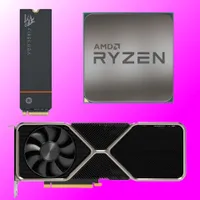US Dept of Justice claims Google 'corrupted legitimate competition in the ad tech industry by engaging in a systematic campaign to seize control'
The antitrust trial has only just started but the DoJ is already aiming for Google's ad tech jugular

It's a fact of modern Internet life that content providers rely heavily on the use of advertising to fund the creation and hosting of material we all view on a daily basis. The technology behind it all is a multi-billion dollar industry and there's one name that tops the charts: Google. So much so, that the US Department of Justice claims that Google has "used anticompetitive, exclusionary, and unlawful means to eliminate or severely diminish any threat to its dominance."
As reported by Ars Technica, the antitrust trial has only just got underway but it's already a firecracker, with the DoJ and witnesses brought to the case not holding back with their criticism and accusations of Google's apparent monopolistic behaviour.
In the filed complaint (pdf warning) brought by the DoJ against Google, it's claimed that the digital display advertising business generates more than $20 billion in annual revenue for publishers in the US, thanks to over 13 billion online ads every day. Managing all of this requires some pretty complex technology (informally just labelled as 'ad tech') and it's here where the DoJ points its finger at Google.
"[C]ompetition in the ad tech space is broken, for reasons that were neither accidental nor inevitable," says the DoJ in its complaint. "One industry behemoth, Google, has corrupted legitimate competition in the ad tech industry by engaging in a systematic campaign to seize control of the wide swath of high-tech tools used by publishers, advertisers, and brokers, to facilitate digital advertising.
"Having inserted itself into all aspects of the digital advertising marketplace, Google has used anticompetitive, exclusionary, and unlawful means to eliminate or severely diminish any threat to its dominance over digital advertising technologies."
That's a pretty damning accusation, couched in no hedging-one's-bets words, and the specific focus of the DoJ's ire is the Google Ad Manager platform, which came from its acquisition of two ad tech companies (DoubleClick and AdX) back in 2008, for a very steep $3.1 billion. According to Ars Technica's report, though, the Federal Trade Commission (FTC) investigated Google's acquisition and fully approved it, finding that it was unlikely to reduce competition in the ad tech market.
I think it's fair to say, however, that the market has altered significantly in the 16 years that have passed since Google snapped up the two companies. The DoJ claims that "Google has wielded its power across the ad tech industry to dictate how digital advertising is sold, and the very terms on which its rivals can compete."
Keep up to date with the most important stories and the best deals, as picked by the PC Gamer team.
To end this, the Dept of Justice wants Google to be court-ordered to spin or sell off Google Ad Manager, which would be tricky to achieve, not least because the platform itself is of far less value than Google's entire ad tech business. I can't imagine it would be ordered to sell that off but you never know.
Whatever the outcome of this particular trial is, I don't suspect for one minute that it will massively change Google's position in the digital advertising market, if at all, but it's certainly worth keeping an eye on the proceedings. Best get that small mountain of popcorn in now.
Best CPU for gaming: Top chips from Intel and AMD.
Best gaming motherboard: The right boards.
Best graphics card: Your perfect pixel-pusher awaits.
Best SSD for gaming: Get into the game first.

Nick, gaming, and computers all first met in the early 1980s. After leaving university, he became a physics and IT teacher and started writing about tech in the late 1990s. That resulted in him working with MadOnion to write the help files for 3DMark and PCMark. After a short stint working at Beyond3D.com, Nick joined Futuremark (MadOnion rebranded) full-time, as editor-in-chief for its PC gaming section, YouGamers. After the site shutdown, he became an engineering and computing lecturer for many years, but missed the writing bug. Cue four years at TechSpot.com covering everything and anything to do with tech and PCs. He freely admits to being far too obsessed with GPUs and open-world grindy RPGs, but who isn't these days?


